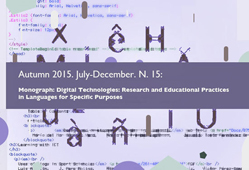Aprendizaje móvil de lenguas basado en criterios pedagógicos
DOI:
https://doi.org/10.7203/attic.15.6407Palabras clave:
Aprendizaje móvil de lenguas, Aprendizaje de Lenguas Asistido por Ordenador, evaluación pedagógica, desarrollo de materiales educativos. Resumen
Resumen
El MALL (Mobile Assisted Language Learning) aporta una inmensa cantidad de aplicaciones de aprendizaje de lenguas. En este contexto es necesario que el triple proceso de análisis, evaluación y desarrollo de aplicaciones de MALL cumpla con dos premisas fundamentales. En primer lugar, debe llevarse a cabo a partir de criterios pedagógicos específicos del aprendizaje de lenguas. En segundo lugar, debe apoyarse en modelos teóricos que consideren el proceso de enseñanza-aprendizaje de lenguas. Este trabajo se enmarca dentro de una investigación más general que propone una metodología para el análisis, evaluación y desarrollo pedagógico de aplicaciones móviles de aprendizaje de lenguas, según las dos necesidades mencionadas. El trabajo presenta dos resultados de dicha investigación general, consistentes en la propuesta de un modelo teórico para el MALL, por una parte, y en la creación de una plantilla o rúbrica para facilitar el análisis, la evaluación y el desarrollo de aplicaciones MALL específicas. En primer lugar, se ha propuesto un modelo teórico de estudio del MALL. Seguidamente, se ha elaborado una plantilla que incorpora parámetros observables que sirven para la descripción, la evaluación y el desarrollo pedagógico de recursos para el aprendizaje de lenguas asistido por tecnologías móviles.
 Citas
Citas
Chinnery, George M. (2006). Emerging technologies: going to the MALL (Mobile Assisted Language Learning). Language Learning & Technology, 10, pp.9-16. http://llt.msu.edu/vol10num1/emerging/
Colpaert, Jozef (2004). Editorial: From courseware to courseware? Computer Assisted Language Learning, 17/3-4, 261-266. http://www.tandfonline.com/doi/pdf/10.1080/0958822042000319575
Ellis, Rod (1992). Second Language Acquisition and Language Pedagogy. Clevedon: Multilingual Matters.
Geddes, S.J. (2004). Mobile learning in the 21st century: benefit to learners. Knowledge Tree e-Journal, 30, 3, pp.214-228.
Kenning, Marie-Madeleine (2007). ICT and Language Learning: From print to the mobile phone. Basingstoke: Palgrave Macmillan.
Klopfer, Eric; Squire, Kurt; Jenkins, Henry (2002). Environmental Detectives: PDAs as a window into a virtual simulated world. Proceedings of IEEE International Workshop on Wireless and Mobile Technologies in Education. Vaxjo: IEEE Computer Society, pp. 95-98. http://ieeexplore.ieee.org/xpls/abs_all.jsp?arnumber=1039227&tag=1
Kukulska-Hulme, Agnes; Shield, Lesley (2007). An overview of mobile assisted language learning: Can mobile devices support collaborative practice in speaking and listening? ReCALL, 20(3), pp.1-20. http://citeseerx.ist.psu.edu/viewdoc/download?doi=10.1.1.84.1398&rep=rep1&type=pdf
Kukulska-Hulme, Agnes (2012). Mobile-Assisted Language Learning. En VVAA, The Encyclopedia of Applied Linguistics. Wiley Online Library.
Levy, Mike (2009). Technologies in Use for Second Language Learning. The Modern Language Journal, 93: 769-782. http://onlinelibrary.wiley.com/doi/10.1111/j.1540-4781.2009.00972.x/abstract
DOI: 10.1111/j.1540-4781.2009.00972.x
Lu, M. (2008). Effectiveness of vocabulary learning via mobile phone. Journal of Computer Assisted Learning, 24/6: 515-525. http://onlinelibrary.wiley.com/doi/10.1111/j.1365-2729.2008.00289.x/abstract
DOI: 10.1111/j.1365-2729.2008.00289.x
McNicol, T. (2004). Language learning on the move. Japan Media Review. https://archive.is/hs9Yp
Miangah, Tayebe M.; Nezarat, Amin (2012). Mobile-Assisted Language Learning. International Journal of Distributed and Parallel Systems (IJDPS) 3(1), pp.309-319. http://www.airccse.org/journal/ijdps/papers/0112ijdps26.pdf
Morita, Masayasu (2003). The Mobile Based Learning (MBL) in Japan. Proceedings of the First Conference on Creating, Connecting and Collaborating through Computing. Kyoto: IEEE. http://ieeexplore.ieee.org/xpl/articleDetails.jsp?arnumber=1222348
Naismith, Laura; Lonsdale, Peter; Vavoula, Giasemi; Sharples, Mike (2005). Literature review in mobile technologies and learning. Futurelab Series. http://www2.futurelab.org.uk/resources/documents/lit_reviews/Mobile_Review.pdf
Norbrook, Hamish; Scott, Paul (2003). Motivation in mobile modern foreign language learning. En J. Attewell, G. Da Bormida, M. Sharples y C. Savill-Smith (eds.). MLEARN 2003: Learning with Mobile Devices, pp. 50–51. http://pegasus.javeriana.edu.co/~sdmovil/recursos/LearningWithMobileDevices.pdf#page=59
Petersen, Sobah A.; Divitini, Monica (2005). Language Learning: from Individual Learners to Communities. En VVAA. Proceedings of the third International Workshop on Wireless and Mobile Technologies in Education 2005, IEEE Computer Society Press, pp.169-173. http://www.idi.ntnu.no/grupper/su/publ/sap/petersen_wmte2005.pdf
Roschelle, J.; Sharples, M. y Chan, T.W. (2005). Introduction to the special issue on wireless and mobile technologies in education. Journal of Computer Assisted Learning 21, pp.159-161. http://onlinelibrary.wiley.com/doi/10.1111/j.1365-2729.2005.00123.x/abstract
Salaberry, M.Rafael (2001). The use of technology for second language learning and teaching: A retrospective. The Modern Language Journal, 85(1), pp.39-56. http://onlinelibrary.wiley.com/doi/10.1111/0026-7902.00096/abstract
DOI: 10.1111/0026-7902.00096
Seiz Ortiz, Rafael (2006). Análisis metodológico de cursos y recursos para el aprendizaje de inglés como segunda lengua a través del World Wide Web. València: Universitat Politècnica de València.
Thornton, Patricia; Houser, Chirs (2005). Using mobile phones in English education in Japan. Journal of Computer Assisted Learning, 21, pp.217-228. http://onlinelibrary.wiley.com/doi/10.1111/j.1365-2729.2005.00129.x/pdf
Traxler, John (2005). Mobile Learning: It’s here, but what is it? Interactions Journal, 9 (1) http://www2.warwick.ac.uk/services/ldc/resource/interactions/issues/issue25/traxler
Trifanova, Anna; Ronchetti, Marco (2003). Where is mobile learning going? En VVAA. Proceedings of the E-learn Conference. Trento: Università degli Studi, pp.1795-1801.
Wong, L-H. y Looi, C-K. (2010). Vocabulary learning by mobile-assisted authentic content creation and social meaning making: two case studies. Journal of Computer Assisted Learning, 26 (5), pp.421-433.
http://onlinelibrary.wiley.com/doi/10.1111/j.1365-2729.2010.00357.x/abstract
DOI: 10.1111/j.1365-2729.2010.00357.x
Yamaguchi, T. (2005). Vocabulary learning with a mobile phone. Program of the 10th Anniversary Conference of Pan-Pacific Association of Applied Linguistics, Edimburgo.
Descargas
Archivos adicionales
Publicado
Número
Sección
Licencia
Todos los artículos de la revista, están sujetos a una licencia Creative Commons del tipo Reconocimiento - NoComercial - Sin Obra Derivada
